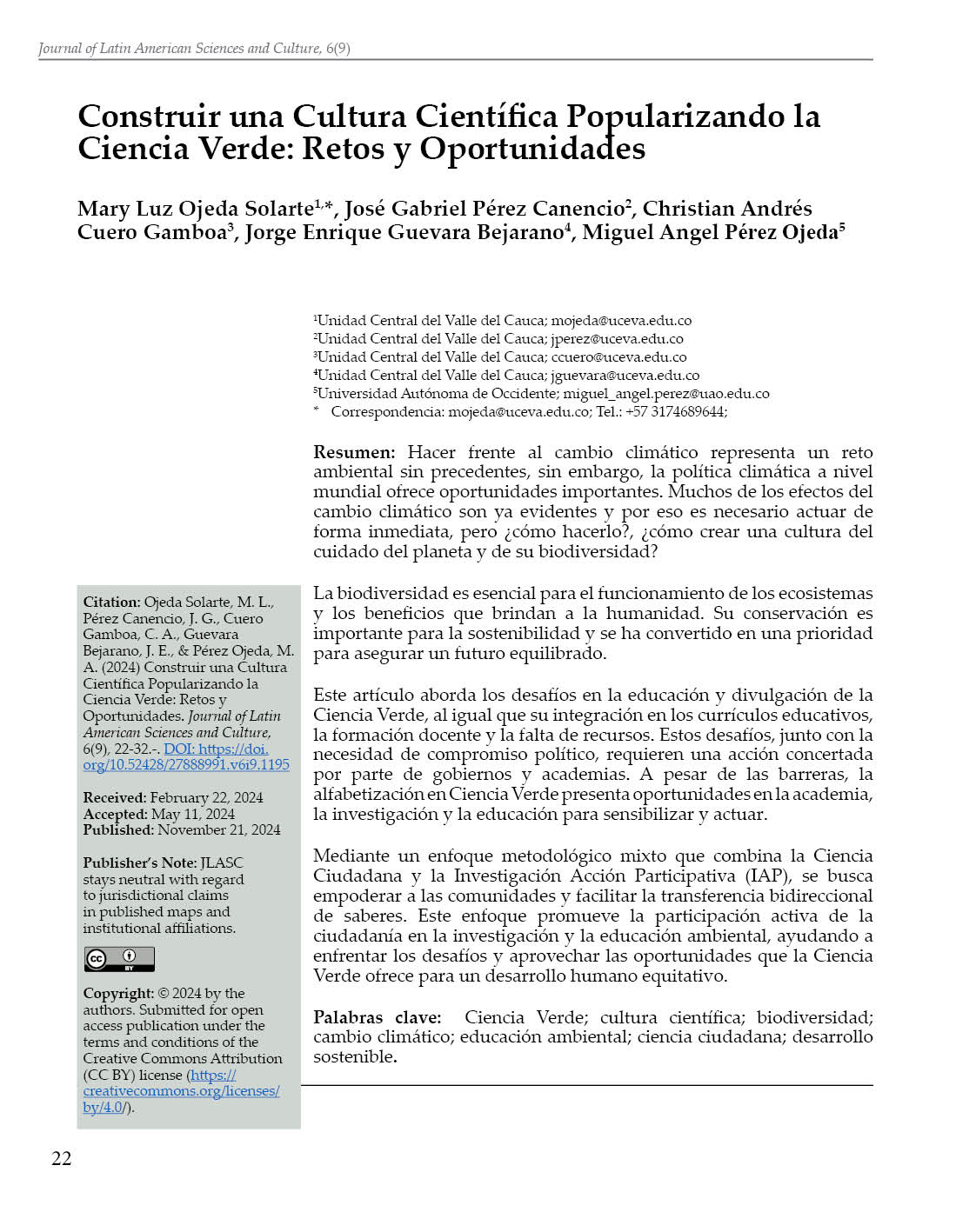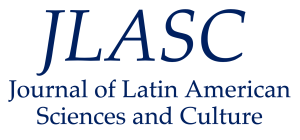Construir una cultura científica popularizando la Ciencia Verde: retos y oportunidades
DOI:
https://doi.org/10.52428/27888991.v6i9.1195关键词:
biodiversidad摘要
Hacer frente al cambio climático representa un reto ambiental sin precedentes, sin embargo, la política climática a nivel mundial ofrece oportunidades importantes. Muchos de los efectos del cambio climático son ya evidentes y por eso es necesario actuar de forma inmediata, pero ¿cómo hacerlo?, ¿cómo crear una cultura del cuidado del planeta y de su biodiversidad?
La biodiversidad es esencial para el funcionamiento de los ecosistemas y los beneficios que brindan a la humanidad. Su conservación es importante para la sostenibilidad y se ha convertido en una prioridad para asegurar un futuro equilibrado.
Este artículo aborda los desafíos en la educación y divulgación de la Ciencia Verde, al igual que su integración en los currículos educativos, la formación docente y la falta de recursos. Estos desafíos, junto con la necesidad de compromiso político, requieren una acción concertada por parte de gobiernos y academias. A pesar de las barreras, la alfabetización en Ciencia Verde presenta oportunidades en la academia, la investigación y la educación para sensibilizar y actuar.
Mediante un enfoque metodológico mixto que combina la Ciencia Ciudadana y la Investigación Acción Participativa (IAP), se busca empoderar a las comunidades y facilitar la transferencia bidireccional de saberes. Este enfoque promueve la participación activa de la ciudadanía en la investigación y la educación ambiental, ayudando a enfrentar los desafíos y aprovechar las oportunidades que la Ciencia Verde ofrece para un desarrollo humano equitativo.
Downloads
参考
Aikens, K., Mckenzie, M., & Vaughter, P. (2018). Investigación sobre políticas de educación ambiental y para la sostenibilidad. Londres: Taylor and Francis Group.
Altrichter, H., Kemmis, S., McTaggart, R., & Skerritt, Z. (2002). The concept of action research. The learning organization.
https://doi.org/10.1108/09696470210428840 DOI: https://doi.org/10.1108/09696470210428840
Bonney, R., Ballard, H., Jordan, R., MacCallie, H., Shirk, J., Phillips, T., & Candie C, W. (2009). Public Participation in Scientific Research: Defining the Field and Assessing Its Potential for Informal Science Education. A CAISE Inquiry Group Report. Institute of education science. Obtenido de Center for Advancement of In.
Glavic, P. (2020). Identificación de cuestiones clave de la educación para el desarrollo sostenible. Sustainability, 12-16.
Gonzalez Gaudiano, E., & Meira Cartea, P. (2020). Educación para el cambio climático: ¿Educar sobre el clima o para el cambio? Perfiles educativos.
https://doi.org/10.22201/iisue.24486167e.2020.168.59464 DOI: https://doi.org/10.22201/iisue.24486167e.2020.168.59464
Institute, World Resources. (2011). Greenhouse Gas Protocol. GHG Protocol Scope 2 Guidance.
Lewis, J., Scheneegans, S., & Straza, T. (2021). UNESCO, Science report:The race against time for smarter development . Unesco.
Manos Antoninis, D. A. (2020). Todo significa todo: Introducción al Informe de Seguimiento de la Educación en el Mundo 2020 sobre inclusión. Prospects, 103 - 109.
National Geographic. (21 de 06 de 2024). Biodiversity. Obtenido de https://education.nationalgeographic.org/resource/biodiversity
Niesenbaum, R. A. (2019). The integration of conservation, biodiversity, and sustainability. Sustainability, 11-17.
https://doi.org/10.3390/su11174676 DOI: https://doi.org/10.3390/su11174676
Pérez , R., & González, A. (2023). Ciencia ciudadana, estrategias de conservación de la biodiversidad y biomonitoreos de los organismos genéticamente modificados (OGM's). Sociedades Rurales, Producción y Medio Ambiente.
Ruano, L. (2023). El diálogo político birregional verde UE-CELAC. Funadación Carolina.
https://doi.org/10.33960/issn-e.1885-9119.DT85 DOI: https://doi.org/10.33960/issn-e.1885-9119.DT85
UNESCO. (2016). El mandato y la mision de la UNESCO en resúmen. Obtenido de https://www.unesco.org/es/brief
UNESCO. (2021). Reimaginando juntos nuestro futuro : Un nuevo contrato social para la educación. París: Unesco.
https://doi.org/10.22201/iisue.24486167e.2022.177.61072 DOI: https://doi.org/10.22201/iisue.24486167e.2022.177.61072

Downloads
已出版
How to Cite
期
栏目
License
Copyright (c) 2024 José Gabriel Pérez Canencio, Mary Luz Ojeda Solarte, Christian Andrés Cuero Gamboa, Jorge Enrique Guevara Bejarano, Miguel Angel Pérez Ojeda

This work is licensed under a Creative Commons Attribution 4.0 International License.
Authors who publish in this journal agree to the following conditions: Authors retain copyright and grant the journal the right of first publication, with the work licensed under a Creative Commons Attribution 4.0 International License, which allows others to use the published work provided they acknowledge the authorship and initial publication in this journal. Authors may enter into separate, additional contractual agreements for the non-exclusive distribution of the version of the article published in this journal (e.g., posting it to an institutional repository or publishing it in a book), provided they clearly indicate that the work was first published in this journal. Authors are permitted and encouraged to share their work online (e.g., in institutional repositories or on personal websites) before and during the manuscript submission process, as this can lead to productive exchanges and increased and faster citation of the published work.








